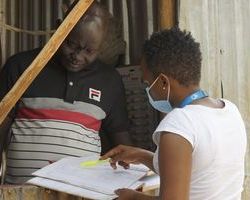“In Kakuma, HI promotes autonomy for all”
In Kakuma refugee camp in Kenya, Racheal works each day alongside people with disabilities to help remove the barriers to accessibility and inclusion.

Racheal Njiru, Disability Inclusive Development Project Manager Kakuma | © Kibali Pictures / HI
Racheal Njiru is the disability inclusive development project manager in Kakuma refugee camp, Kenya. She is a member of HI's international teams who work every day to promote solidarity and inclusion. Discover what she does and why!
Working in humanitarian aid to bring about positive change
I’ve been working at HI for over three years as project manager. I chose the humanitarian sector because I love community work. I’ve always felt the need to help others. I trained in the social sciences at Daystar University, in Nairobi, to get the skills and knowledge I need to do this.
I particularly enjoy working in the socio-economic sector, supporting refugees in developing their businesses. I want to help bring about positive change, to contribute to the socio-economic development of my country, and more generally of Africa.
Remarkable stories and people
What motivates me is to see that I can make a difference in someone's life. I like to support people in developing a project and see their situation improve. It’s very inspiring to meet people we’ve helped and whose lives have changed.
Some stories leave their mark. I remember one woman who really impressed me. Every month, she delivered coal to a company. Then COVID came along, which upset everything and threatened the survival of many small private businesses like hers. But she wasn’t discouraged. She used the financial support and training that HI gave her to save money and build five rental houses. Now she can rent them out and has a new income stream. I really admire this woman's strength and determination.
Everyday problems in the refugee camp
 Kakuma camp is home to nearly 200,000 refugees who live in very cramped conditions. The resources available to them are insufficient and ill-adapted. For example, there are not enough schools for the number of students. Even the geographical location of the camp is not ideal. It's located in Kenya's arid zone where it can get extremely hot. During periods of drought, people are in danger of losing their livelihoods.
Kakuma camp is home to nearly 200,000 refugees who live in very cramped conditions. The resources available to them are insufficient and ill-adapted. For example, there are not enough schools for the number of students. Even the geographical location of the camp is not ideal. It's located in Kenya's arid zone where it can get extremely hot. During periods of drought, people are in danger of losing their livelihoods.
For people with disabilities, there are also physical barriers affecting accessibility in the camp. The infrastructure is not adapted and some people with disabilities have to depend on their relatives to help them access buildings or get around the camp.
Being inclusive to support the most vulnerable
Refugees with disabilities face systemic obstacles and barriers. For example, they are not members of the National Council for Persons with Disabilities. This means they don’t benefit from the measures in place for people with disabilities in Kenya, such as training opportunities, distributions of mobility aids or tax exemption for businesses.
It is vital to understand that the people we work with face complex issues, which can make them more vulnerable than others. For example, when different services are offered within the camp, we have to take care to include those who are most vulnerable by asking the right questions. Who are the people most at risk? Will they have access to distribution sites? It is our responsibility to take these aspects into account when identifying needs and delivering humanitarian aid.
In the Kakuma refugee camp, HI runs a project which offers functional rehabilitation, psychosocial support & inclusion services, as well as inclusive education and economic inclusion projects. Our goal is to empower everyone to be autonomous. We take a holistic approach, promoting people’s dignity and aiming to improve all aspects of their daily lives. Inclusion is everyone's business and together we can make a difference!





